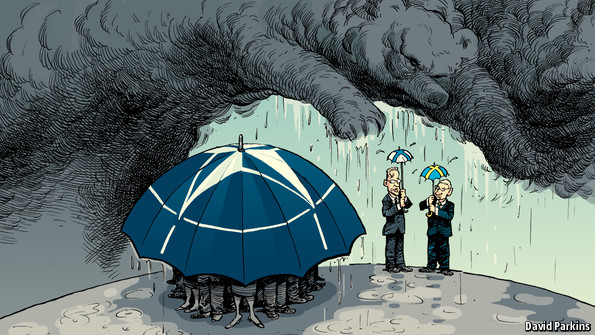S
ince the Russian annexation of Crimea and the war in Ukraine, Sweden’s relationship with Russia has been marked by growing insecurity. In March, 2013, Russian military aircraft simulated a large scale bombing run on Sweden, with two Tu-22M3 Backfire bombers skirting the island of Gotland in the Baltic Sea. In October, 2014, Swedish authorities allegedly discovered a submarine in the archipelago outside Stockholm; the ill-equipped Swedish navy was unable to find it afterwards, but the government believed it to be of Russian origin. Russian military planes have on several occasions flown close to Swedish airspace, causing the air force to be on constant alert. Back in March, 2015, the Swedish secret service Säpo announced that Russia is the country’s largest threat, and has been illegally gathering information on its defense, politics and technology. William Young, a chief analyst at Säpo, went as far as suggesting that “every third Russian diplomat is an intelligence officer.”
To many Swedes, the best response to the Russian threat is to increase cooperation with its NATO friends. Last month in May, a poll found that 31% of respondents thought joining NATO would be a good idea. This is the largest approval rating yet, up from 17% in 2012. Cooperation with NATO has been strong, with military collaboration between the Scandinavian country and the Alliance. In 2013, Sweden joined the NATO Response Force (NRF) and participated in Exercise Steadfast Jazz, an operation involving 6,000 troops showcasing the effectiveness of NATO’s new rapid-reaction force.
 Sweden has a long history of cooperating with NATO, despite not being a member of the organization. It participated in NATO peacekeeping missions in Bosnia and Herzegovina in 1995 and Kosovo in 1999; worked alongside the International Security Assistance Force (ISAF) in Afghanistan in 2003; and led the Provincial Reconstruction Team (PRT) in Mazar-e-Sharif in 2006. More recently, it deployed eight aircraft to support the no-fly zone over Libya in 2013, supporting air-to-air refuelling. Despite this, Sweden has always remained de facto neutral in terms of formal alliances.
Sweden has a long history of cooperating with NATO, despite not being a member of the organization. It participated in NATO peacekeeping missions in Bosnia and Herzegovina in 1995 and Kosovo in 1999; worked alongside the International Security Assistance Force (ISAF) in Afghanistan in 2003; and led the Provincial Reconstruction Team (PRT) in Mazar-e-Sharif in 2006. More recently, it deployed eight aircraft to support the no-fly zone over Libya in 2013, supporting air-to-air refuelling. Despite this, Sweden has always remained de facto neutral in terms of formal alliances.
Sweden has also harboured doubts that the country can defend itself against Russian aggression. In an assessment in 2013, Sweden’s Chief of the armed forces said that the country would be able to hold off a Russian attack for “only a week” due to defence budget cuts. In response to this perceived vulnerability, the country announced a spending increase of 10.2 billion kronor (US$1.1 billion) for the 2016 to 2020 period. Although necessary to modernize its fleet in response to the submarine incident, the money is still 8 billion kronor short of the amount requested by the armed forces.
Given Sweden’s cooperation and defense gap, joining NATO appears a logical step. Yet Swedes are hesitant to give up their neutrality or non-aligned policy that led them safely through both world wars and the Cold War. In a 2014 poll, 37% of Swedes still opposed NATO membership, a small decrease from 45% in 2012. Debate continues in the Swedish government. The centre-right Moderate party is in favour of joining NATO, with leader Anna Kinberg Batra calling in January for “a study on the concrete preconditions for Swedish membership of NATO.” In response, Defense Minister Peter Hultqvist, part of the governing centre-left Social Democrat party, proclaimed the defense issue as “about the concrete challenges we face with our own defense capability,” rather than having to rely on allies.
The threat of Russia also looms over Sweden’s NATO debate. The Russian Ambassador to Sweden, Viktor Tatarinstev warned of “consequences” if Sweden joined NATO, as Russia “will have to resort to a response of the military kind and re-orientate our troops.” Thus Sweden is faced with a difficult and polarizing decision, as both joining NATO and remaining neutral carry strong advantages and disadvantages. Right now, the Social Democrats have a secure coalition within the Riksdag, with the next election not until 2018. Assuming no further Russian provocations, Swedish neutrality may be secure until that time.




